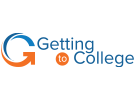Is College (or other postsecondary programs) like High School?
#
Differences Between High School and College
There are basic differences between the focus, legal protections, and accommodations for services and support for students with disabilities pursuing higher education. Secondary education (high school) focuses on student success with a team of educators, parents, and supporters working together to promote a student's success. In contrast, post-secondary education (universities and colleges, trade and vocational schools) focuses on ensuring a student can access the post-secondary environment based on the colleges’ admission criteria.
Small GTC Logo: GTC focuses on providing resources, training, and support for everyone to have the opportunity to go to any post-secondary school or to an inclusive post-secondary school that is the best fit for the individual.
This chart shows a breakdown of many (but not all) of the differences a student may need to know about and prepare for when exploring post-secondary education.
Differences Between High School and College for Students with Disabilities |
|---|
High School (secondary education) |
College (post-secondary education) universities, colleges, trade and vocational schools) |
|---|---|
|
Focus is to promote SUCCESS |
Focus is to provide ACCESS |
| Legal Foundation: The Individuals with Disabilities Education Act (IDEA) and Section 504 of the Rehabilitation Act are implemented at the secondary school level with an aim toward success for all students entitled to a Free and Appropriate Education (FAPE) at their Local Education Agency (LEA). |
Legal Foundation: The Americans with Disabilities Act (ADA) as well as Section 504 of the Rehabilitation Act guides college-level accommodation policy with an aim toward access for “otherwise qualified” students based on the colleges’ admission criteria. |
|
Modification of instruction and curriculum are commonly provided in response to student learning needs. The school is responsible for identifying a student’s disability, determining eligibility for services and implementing appropriate accommodations. |
Through an interactive interview process with the post-secondary school, reasonable accommodations are identified to ensure equal access and participation. Students are responsible for meeting the standards of the course, and essential elements of the course objectives are not modified. |
|
School-based services based on demonstrated need are put in place to promote success, such as:
|
College accommodations are intended to mitigate the impact of disability based on eligibility to ensure access, such as:
|
| In high school, a team of educators and parents work together to provide services to promote a student's success. | In college, the student is responsible for seeking out services and accommodations by contacting the disability service office. |
| Personal aide services are arranged and provided by school district. | The college is not responsible for personal aide services |
| Teachers and parents remind students to complete homework, help in exam preparation, and aid with time management |
Students independently plan homework and create reading and study schedules |
|
High school provides a highly regimented, closely monitored schedule with homework assigned at regular intervals |
College schedule has more free, unstructured time; classes meet less frequently, more difficult homework, and typically have a heavy reading load |
|
Parents communicate routinely with teachers, and can easily monitor student academic progress |
Parents have no contact with instructors, and written consent is required to access student progress or health information |
|
Parents and teachers guide and intervene on the student’s behalf, recommending strategies and supports |
Students need to self-advocate, articulate their needs for services and accommodations proactively, and pursue resources on campus for assistance |
For More Information:
-
Think College (https://thinkcollege.net/) - Think College provides resources, technical assistance and training related to college options for students with intellectual disability, and manages the only national listing of college programs for students with intellectual disability in the United States.
-
Pacer.org (https://www.pacer.org/transition/learning-center/postsecondary/college-options.asp) - PACER’s National Parent Center on Transition and Employment builds on PACER’s decades of experience providing high quality assistance and support to parents, youth, and professionals on transition topics.
-
Higher Ed jobs article- “These Programs Make College Possible for Students with Developmental Disabilities” (https://www.higheredjobs.com/Articles/articleDisplay.cfm?ID=3757&Title=These%20Programs%20Make%20College%20Possible%20for%20Students%20with%20Developmental%20Disabilities)
-
University of Wisconsin Video
(https://youtu.be/wxC_v7I46oU?si=Fzwpl1DuIlWY6Exr)
UW HELP, along with panelists from UW-La Crosse and UW-Whitewater, share information about how students with accessibility/disability needs can successfully transition from high school to college. Approximately 30 minutes.
